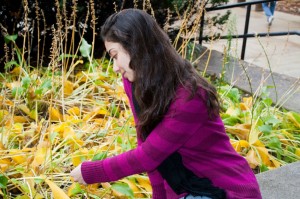America is made up of a colorful puzzle of different cultures. Families and individuals from other countries may still consider America to be the place for a new start. STLCC-Meramec student, Dastan Abdulqader knows how difficult leaving one’s homeland can be.
Kimberly Morice
-Staff Writer-

America is made up of a colorful puzzle of different cultures. Families and individuals from other countries may still consider America to be the place for a new start. STLCC-Meramec student, Dastan Abdulqader knows how difficult leaving one’s homeland can be.
“We left all of our family and friends, which was a horrible day. I can’t even remember it because if I remember it, I’m going to cry,” Abdulqader said.
Abdulqader was born in Baghdad, Iraq, and after the war in 2003, she and her family moved to Northern Iraq.
“My parents are from the north, so it made sense for us to go there. All our family and friends are from the north,” Abdulqader said. “The work was good, so they paid [my father] good, so we got our house and car, which was really good. The army then gave my father a special visa to come here, and we were stressed out to come here. It’s America, it’s different.”
In Iraq, Abdulqader’s family was rich compared to other families; they had a house, a car, and were able to live comfortably. Her mother was a high school math teacher, her father worked for the army and each were secure in their jobs. Living in America has been a different story.
“Here we’re living in an apartment, which is tiny and my mother doesn’t like it. She’s used to a big kitchen and big bedrooms, now we have a small kitchen and small everything,” Abdulqader said. “She’s at home and cooking a lot, which is different. It’s also been hard for my dad to get a job. Here, he applied for 80 jobs and didn’t get one for a long time, he finally found a job.”
Abdulqader’s father, who know three languages, now works as a translator in the city. Abdulqader, and her siblings, all known three languages: Kurdish, which is the language commonly spoken in Northern Iraq, Arabic and English.
“My older brother is also a translator in the city. I have a younger brother who is in high school and doing really well and also a five-year-old brother who is learning all of the American things in school. It’s really neat,” Abdulqader said.
Out of all the American cities Abdulqader and her family could have moved to, they chose St. Louis. Her father has a friend who is married to an American woman who is from St. Louis.
“If it was up to me, I would come to New York or California or somewhere famous,” Abdulqader said.
In Iraq, most people her age spend their days studying with no break. Abdulqader and other students go to school six days a week, with Friday being their only day off. Most Friday evenings, Abdulqader’s family would gather at her aunt’s house and one of her grandmothers would cook dinner for all of her children and grandchildren.
“We go to the mall or something, with only one day off we have to do something fun,” Abdulqader said.
Abdulqader’s life in Iraq is a stark contrast to the life she currently lives in America.
“Here, there are more fun things to do. I study, you can say, not that much, because the material is not that hard here,” Abdulqader said. “It’s fun here. You can find places that are fun.”
Abdulqader and her family were hesitant about moving to America, a country with a sometimes clouded view on the Iraqi people.
“It was so hard. My mom is a Muslim, like I’m a Muslim too, and she wears the hijab so we were afraid of coming here. She’s just being modest, but we came here expecting that everyone would be mean to my mom. When we came here, it was a big surprise because no one was mean to her. Everyone was so accepting of her,” Abdulqader said.
Abdulqader hopes to become a dentist while she is living in America, but ultimately she wants to take her career and go back to Iraq. Abdulqader said she can hardly concentrate on school because of how much she wishes to return to her homeland.
“That’s what I hope for every single day. Every single day,” Abdulqader said.
If Abdulqader did not have to study, she would return to Iraq. With our schools and different learning methods, she will not have to spend as much time studying as she would if she were living in Iraq.
“Here, you can aim high and achieve your dream,” Abdulqader said.











